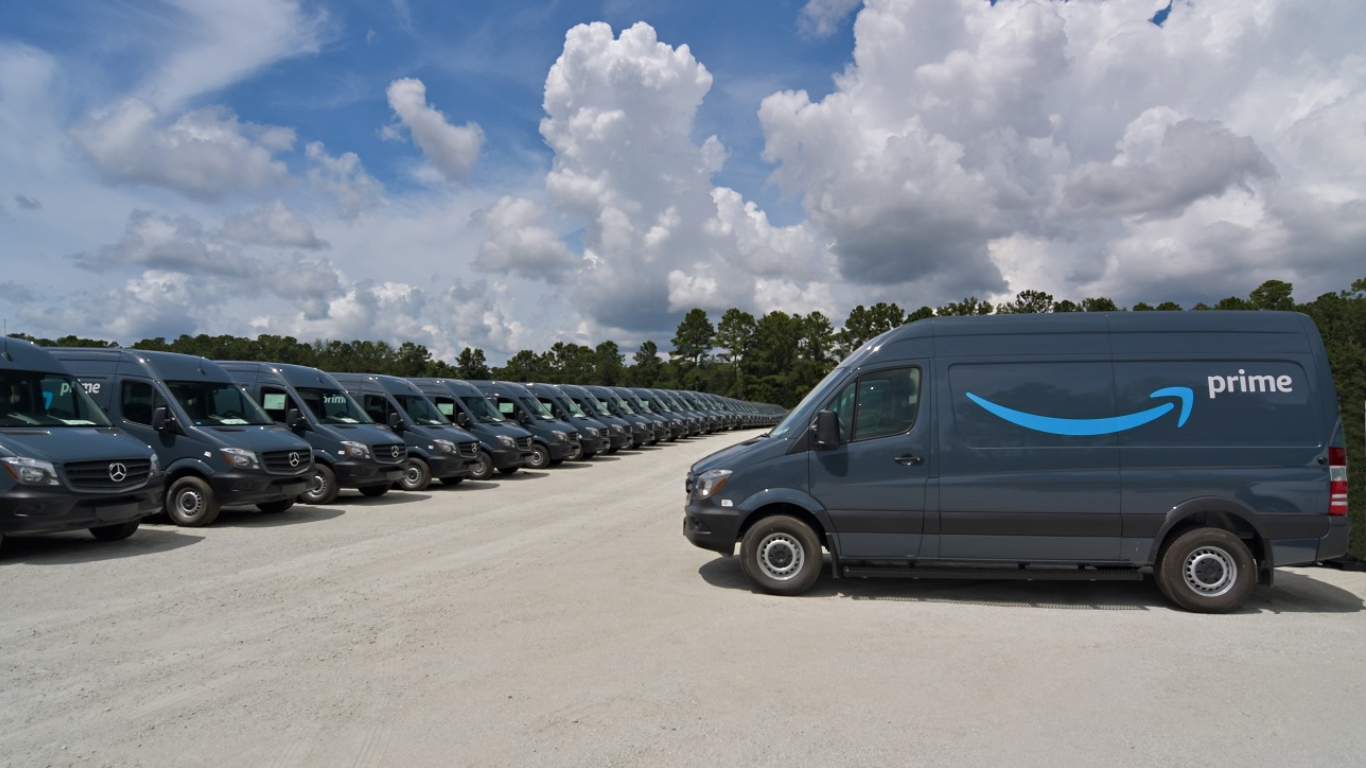
When a company the size of Amazon.com Inc. (NASDAQ: AMZN) stirs, the landscape can change. According to a report in The Wall Street Journal, the e-commerce behemoth is shutting down in June what is basically a last-mile package delivery service. The service was widely seen as a nascent threat to industry giants FedEx Corp. (NYSE: FDX) and United Parcel Service Inc. (NYSE: UPS).
To be clear, Amazon is reportedly shutting down a service called Amazon Shipping that picks up packages from business partners and delivers the packages to customers. None of the shipments originate at an Amazon warehouse, and the program was available in only a few cities (Los Angeles and London were test sites).
[in-text-ad]
According to the report, sources say the announced closure comes in response to a need for more workers to handle the boom in Amazon’s own orders brought on by the COVID-19 outbreak.
There is no mention of shutting down Amazon’s logistics and shipping services, which includes thousands of vehicles and trailers and air cargo planes. At the end of 2019, Amazon owned an 8.7% stake in Atlas Air Worldwide Holdings Inc. (NASDAQ: AAWW) and less than a 5% stake in Air Transport Services Group Inc. (NASDAQ: ATSG). In August of 2016, Amazon contracted with the firms to provide air cargo services.
That business must be flourishing because Amazon purchased five Boeing 737-800 freighters and may add 15 more to its fleet at Atlas Air by May 2021. It also holds warrants that would give Amazon a 39.9% economic stake in Atlas Air.
The Amazon Shipping service must not be providing the returns Amazon either expected or needs. When that happens, it generally means that the company has thrown substantial effort and significant cash at ginning up a new revenue stream and that it no longer intends to throw good money after bad.
Amazon did the same thing last year when it figured out that it could not win in the food delivery business dominated by DoorDash, Grubhub Inc. (NYSE: GRUB) and Uber Technologies Inc.’s (NYSE: UBER) Uber Eats, which together claim nearly 90% of the food delivery business. Uber’s ride-hailing competitor Lyft Inc. (NASDAQ: LYFT) also chose to stay out of the food delivery business.
Another possibility is that Amazon has not given up but is merely keeping its powder dry. The company invested $700 million in electric truck maker Rivian in February of 2019 and led another financing round of $1.3 billion in December. Electric delivery trucks could change the profit equation for the e-commerce giant.
FedEx, which cut its ties with Amazon last summer, traded up more than 7% Wednesday morning, at $124.25 in a 52-week range of $88.69 to $199.32. The stock’s consensus 12-month price target is $142.17.
UPS stock traded up about 3.4% to $96.06, in a 52-week range of $82.00 to $125.31. The stock’s price target is $111.91.
Atlas Air stock traded up 1.3%, at $23.44 in a 52-week range of $14.96 to $51.99 and with a price target of $46.67.
Air Transport shares traded up about 3.4% at $19.01. The 52-week range is $13.20 to $25.60, and the price target on the stock is $26.21.
Want to Retire Early? Start Here (Sponsor)
Want retirement to come a few years earlier than you’d planned? Or are you ready to retire now, but want an extra set of eyes on your finances?
Now you can speak with up to 3 financial experts in your area for FREE. By simply clicking here you can begin to match with financial professionals who can help you build your plan to retire early. And the best part? The first conversation with them is free.
Click here to match with up to 3 financial pros who would be excited to help you make financial decisions.
Have questions about retirement or personal finance? Email us at [email protected]!
By emailing your questions to 24/7 Wall St., you agree to have them published anonymously on a673b.bigscoots-temp.com.
By submitting your story, you understand and agree that we may use your story, or versions of it, in all media and platforms, including via third parties.
Thank you for reading! Have some feedback for us?
Contact the 24/7 Wall St. editorial team.
 24/7 Wall St.
24/7 Wall St.